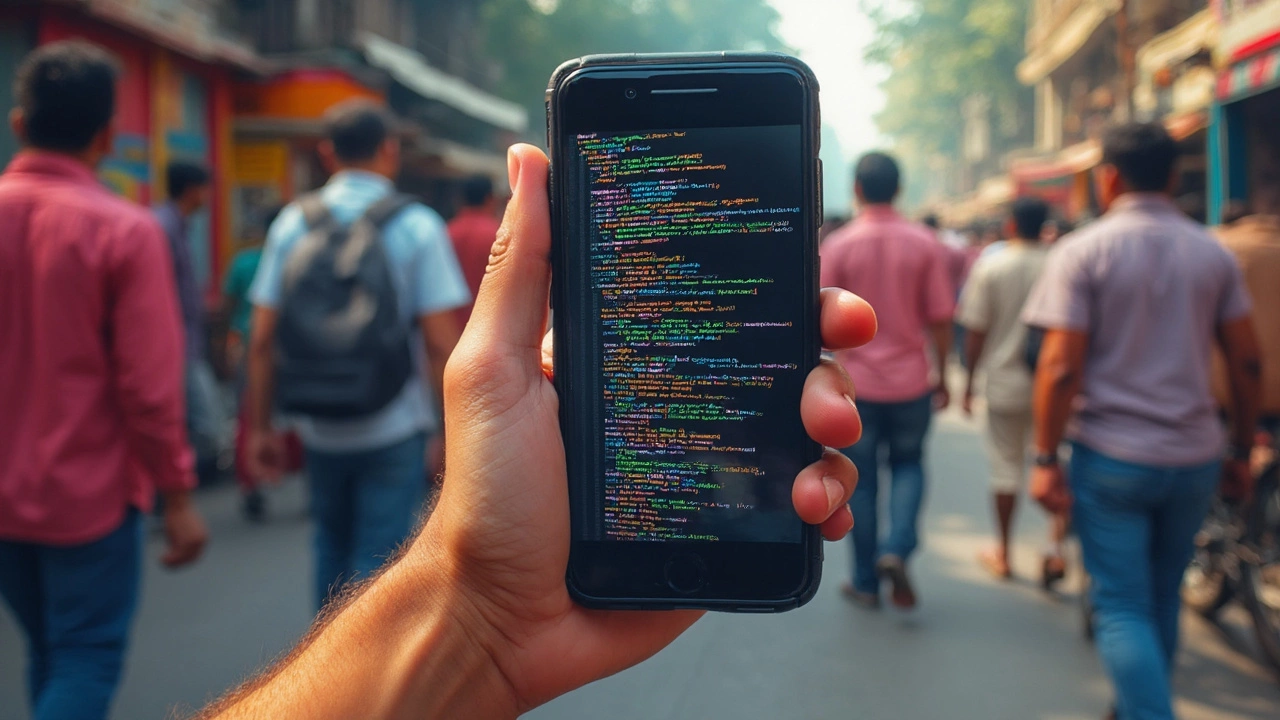Did you know you can actually code on your phone? Yep, you read that right. With technology making leaps and bounds every day, you don't need a fancy computer to start creating software. Your trusty smartphone can become a pretty powerful tool for coding, if you know where to begin.
Why would anyone code on a phone, though? Well, it's convenient for one. Say you’re waiting for a friend or chilling at a coffee shop—you can sneak in some coding practice or work on your side project right from your pocket. Plus, if you're a beginner just starting out, a phone can be less intimidating than a full-fledged laptop setup. It’s all about making the most of your time wherever you are.
Of course, like anything new, there are specific tools you'll need. There are plenty of apps designed to make mobile coding feasible. Apps like SoloLearn and Grasshopper are very user-friendly and are great for learning step by step. For more serious projects, you'd probably look into more robust solutions like AIDE or Juno, which offer features closer to what you’d find on a desktop. These apps aren't just gimmicks—they genuinely allow you to write, run, and debug code right on your phone.
Why Code on a Phone?
You might wonder, why would anyone prefer coding with a phone? It's all about mobility and quick access. Let's face it, a mobile device is always at hand, unlike a bulky laptop or desktop. It's this portability that makes a smartphone a handy tool for both budding and seasoned programmers alike.
Think about those times when you’re on the go—commuting, waiting in line, or just chilling on the couch. Having the ability to code whenever the mood strikes is a game-changer, right? It allows you to seize those micro-moments of free time and turn them into productive coding sessions. You're effectively carrying a mini coding studio in your pocket!
Beginner's Playground
If you're just dipping your toes into the world of programming, doing so on a smartphone can be less daunting. There's often a perception that you need a high-spec computer setup to start learning coding, but that's just not the case anymore. With a variety of beginner-friendly apps available, coding on a phone offers a simplified, user-friendly entry point that can make the learning curve a lot less steep.
Practicality and Productivity
For those further along in their coding journey, it's all about practicality. You might not be developing an entire software suite on your phone, but tweaking code snippets, reviewing projects, or practicing algorithms for interviews is perfectly feasible. If inspiration strikes while you’re away from your computer, you can jot down your ideas or even prototype them right away.
Flexibility Meets Growth
Coding on a phone isn’t designed to replace traditional setups. Instead, it complements a developer's toolbox, offering flexibility that was previously unheard of. With advancements in cloud technology, you can start coding on your mobile and seamlessly switch to a desktop later without losing any progress.
Tools and Apps
When it comes to coding with a phone, there are quite a few tools and apps that can make the process both practical and efficient. You don't need to feel confined by traditional means thanks to these mobile-friendly solutions!
Beginner-Friendly Apps
If you're just getting into programming, you can't go wrong with apps like SoloLearn and Grasshopper. These apps are designed with newbies in mind, offering interactive lessons and challenges that help you grasp the basics without getting overwhelmed. They break down concepts into bite-sized pieces, making learning to code on a mobile device as fun as it is educational.
Intermediate to Advanced Apps
For those who have a bit more experience under their belts, tools like AIDE (Android IDE) or Juno can provide a more robust coding environment. AIDE is great if you're into Android app development—it lets you write, compile, and run apps right on your phone! Meanwhile, Juno brings the power of Julia to your mobile, perfect for those venturing into data science territory.
Cross-Platform Development
If your goal is to create something that runs across different platforms, consider using an app like Pydroid. This Python IDE lets you handle scripts, run small projects, and includes a package manager—all from your smartphone. It’s neat for those who want to work in Python, a coding language popular among both beginners and experts alike.
Code Editing and Management
Beyond writing code, managing it is crucial. Apps like Termux offer a Linux terminal, providing the ability to use various programming tools available on your desktop. And if you need to edit some files on the go, Dcoder serves as a handy mobile IDE supporting over 50+ languages.
| App | Purpose | Platform |
|---|---|---|
| SoloLearn | Learning basics | iOS, Android |
| AIDE | Android app development | Android |
| Pydroid | Python development | Android |
| Dcoder | General coding | iOS, Android |

Pros and Cons
Coding on your phone can be a real game-changer, but it’s not all sunshine and rainbows. Let's break down where it shines and where it stumbles a bit.
Pros
- Mobility: The biggest pro? You can code anywhere. Stuck in a long commute or in a waiting room? Whip out your mobile and get cracking.
- Access to Resources: You’ve got a world of tutorials and coding communities like StackOverflow at your fingertips, right in your pocket.
- Cheaper Start: If you’re new to coding, diving in with a phone means you don’t need to shell out big bucks for a laptop just yet.
- Great for Learning: Apps are designed to be engaging, making learning feel like a game. This can be super motivating for beginners.
Cons
- Screen Size: Let’s be real, staring at code on a tiny screen can be a bit of a strain, especially when you’re debugging long scripts.
- Typing Efficiency: Typing on a phone just isn't as swift as a keyboard, which can slow you down, especially with languages that require lots of special characters.
- Limited Power: While phones are getting more powerful, they can't yet match up to desktops for handling larger projects or running heavy-duty software.
- App Limitations: Some features you get in desktop IDEs (Integrated Development Environments) might not be available, which can limit advanced coding tasks.
So, should you code on your phone? If you’re just getting started or need to make use of your spare time, definitely give it a go. But if you’re tackling a big project, you might find yourself needing the tools and comfort of a desktop setup.
Tips for Mobile Coding
Coding on a phone might seem tricky at first, but with a few simple adjustments, you can make it work pretty smoothly. Let's look at some handy tips that can enhance your mobile coding experience.
1. Choose the Right Keyboard
Your phone’s default keyboard may not cut it. Consider using an app like Hacker's Keyboard to get those all-important shortcut keys, like Ctrl and Tab, which are a lifesaver for programming tasks. A good keyboard makes a huge difference when switching between symbols and letters.
2. Pick Mobile-Friendly Coding Apps
Select apps that are optimized for mobile screens and come loaded with useful features. Apps like Pydroid 3 or CppDroid can handle different coding languages right on your mobile device. They offer built-in compilers, which mean you can run and test your code instantly.
3. Keep Things Organized
Working on multiple files gets tricky on a small screen. Keep your projects organized by using cloud storage solutions like Dropbox or Google Drive. This way, you can access your files anywhere without hassle, ensuring your programming workflow remains uninterrupted. Plus, it’s a good backup strategy.
4. Use External Accessories
If you're getting serious about coding on your phone, think about using Bluetooth keyboards or stylus pens. They greatly enhance your control and make typing long lines of code less of a chore. A stand for your phone might also make things comfortabler for extended sessions.
5. Maximize Idle Time
Take advantage of those moments in your day where you're doing nothing—like waiting in line or during your commute. Even if you spend just 10-15 minutes a day, it adds up. You’d be amazed at how these small sessions can polish your skills over time.
6. Technical Drawbacks to Consider
Remember that mobile devices might have limitations in processing power compared to a full PC setup. Complex projects could slow down your phone considerably, but for small scripts and learning purposes, a phone does just fine.
Mobile technology keeps evolving, and so do the tools for mobile coding. With the right techniques and resources, coding on a phone can be more than just a stop-gap—it might actually become quite practical.
